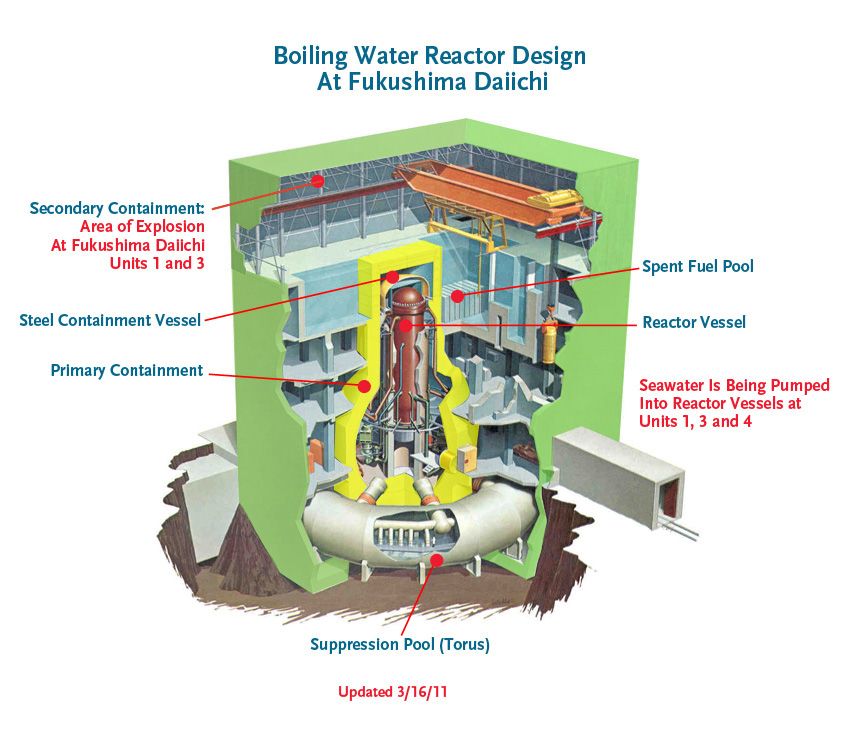It almost goes without saying that the events in Japan were truly tragic, and I can only begin to imagine the pain felt by the Japanese people. My heart goes out to all who have suffered.
When it seemed that the tsunami had run its deadly course, the Japanese people must have begun to feel some relief, only to be struck by the nuclear plant explosions and enter a new streak of fear. That agony has been exploited by many in other countries, seeking to push their own agendas and gain under a mask of sympathy or pseudo-smugness. Aphisit Vejajiva, PM of Thailand, announced he had "always" opposed nuclear energy even before the crisis, though strangely it was not something he'd ever discussed before. Angela Merkel stated she would not be extending the life of expired nuclear reactors in Germany that were already de-commissioned anyway. A "green" campaigner in Australia said the accident was evidence that: " ..."when you pull the plug on reactors, they potentially lose control."
It's sad to see people with the temerity to spout such selfish and ignorant nonsense in the face of other's suffering, but even in the absence of such pain, the debate on nuclear energy is one driven by arrogance and received wisdom. The word "nuclear" is inextricably joined up with the word "bomb" in the psyche of most humans and conjures up images of explosions (duh), men in radiation suits and orange, yellow or green signs, perhaps we all have an image of a certain apocalyptic video game in mind, too. The reality is different.
Nuclear energy is the only truly viable, cost effective and clean form of fuel we currently are aware of. The events in Japan are yet to be fully understood but have certainly been misrepresented and the dangers of nuclear energy are vastly misunderstood. It's now time to understand the basics of nuclear energy nuclear energy as concisely as possible.
What is nuclear energy and how does it work?
An amazingly obvious and simple question, yet one I'll bet many anti-nuclear activists have little or no knowledge of. Don't believe me? Check for yourself, grab one of the most outspoken and ask them to give a scientific, factual description of the very basic mechanisms of nuclear reaction.
Nuclear energy usually uses Uranium-235, because this type produces spontaneous fission under the right conditions i.e. being hit with neutrons. When hit, the uranium will release other neutrons, because an atom has split. This all happens quicker than the blink of an eye and generates tremendous energy. To stop an excess of chain reactions (i.e. thrown of particles hitting other particles and so on) control rods are used to absorb excess neutons and regulate temperature.
The whole process takes place in an environment very similar to a fossil fuel plant. Two separate bands of water are in flow around the reactor unit. One is kept around the uranium unit itself and is kept under high pressure to void boiling even at very high temperatures, the other never touches the first water unit but feeds off its heat, and uses that steam to power a motor that generates the electricity. Hardly sounds like the stuff of apocalyptic nightmares, eh?
The environment
The exact structure of nuclear buildings vary according to age. New plants have the reactors themselves surrounded by steel casing, concrete reinforcing (usually several feet thick), steel reinforcement rods and typically several more layers atop this. Many plants are built underground. In short - they are more protective than a president's bunker. The case in Japan is an absolute "worst case" scenario of a combination of earthquake, tsunami, fire and explosion in an aging plant and as we will see, there is no evidence of any serious damage yet.
The waste
Many anti-nuclear campaigners (they generally label themselves as such, without the "energy' tag as that might pin them down to specific detail or force them to acquire knowledge of their subject) cite concerns over nuclear waste, its transport and threats of radiation as their main concern.
The waste produced during nuclear fission is ionising radiation from uranium. Although Uranium-235 can be recycled, it usually isn't. Instead it is kept in seclusion until its radioactivity levels decrease, then it is transported in specially designed tanks to a disposal point. In the USA, these tanks have covered over 1.7 million miles without a single accident. Safety tests in the US have included a deliberate collision with a flaming vehicle at a speed of 150mph. The unit was completely unharmed. Indeed, there are no reported accidents caused by nuclear waste transportation.
The disaster in Japan and past events
In short, 3 Mile Island was actually a very minor incident that resulted in no hospitalisations. Chernobyl was a far bigger disaster, caused by Soviet-era reactors and operative incompetence. The design of the plant was very different to modern plats. To cite the latter incident as an argument against nuclear energy is like citing the Titanic as an argument against sea travel.
 |
| www.nei.org |
But why?
Known of this matters a jolt if nuclear energy is not the best source of energy for the future, but it is. It is very safe, remarkably efficient, clean and cost effective. No others source comes close except hydro-energy, for which we have yet to develop a cost effective system. Forget solar energy which cannot power the lights in a small house. Forget wind energy, for which an eight year old should be able to spot the flaws in the system. Fossil fuels are finite and bio-fuels are often the higher pollutants.
Any independent, scientifically minded and balanced investigation must surely conclude that nuclear energy is the way forward. Yes, it has dangers just like any fuel system - natural gas has caused tragic deaths this year, coal mining causes more deaths per year on average than Chernobyl - but with the massive benefits of modern technology we finally have a chance to utilise a system that could play big part in preserving Earth and its environment for the future. It would be truly cruel to exploit the tragic deaths in Japan as an excuse to argue ignorantly, emotionally and bigotedly against it.
Sources and resources:
Nuclear Energy Institute
World Nuclear Association
Australian Nuclear Science and Technology
How stuff works - nuclear power
Radiation Answers
International Atomic Energy Agency
